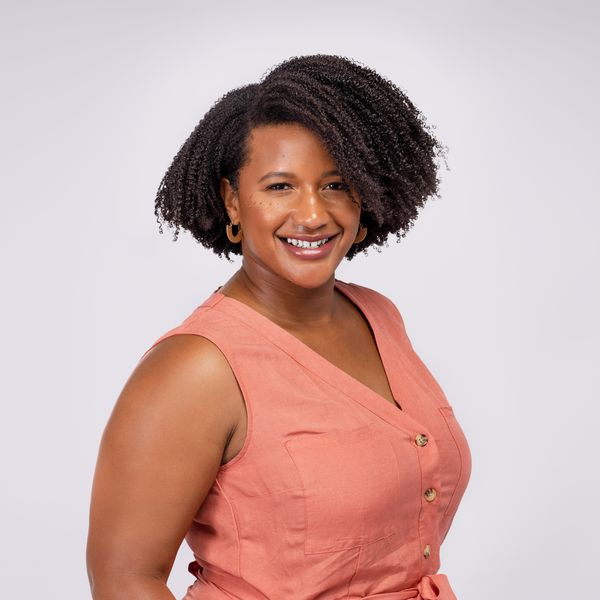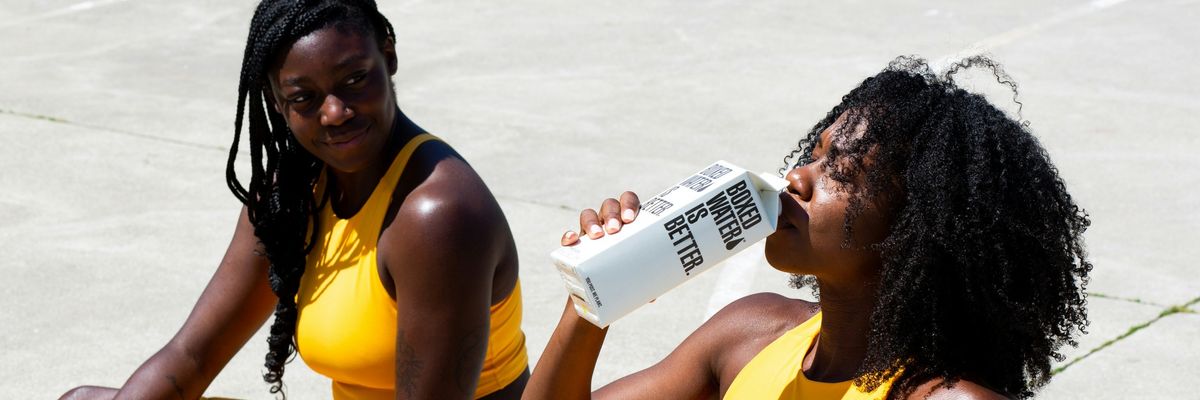The Brown Bohemians Are Carving Out Space For Blackness & Intersectionality On A Global Scale

The word "Bohemian" has been used throughout history to describe a person who is socially unconventional and involved with the arts. However, Black people are essentially invisible when it comes to the bohemian lifestyle, even though we are the very definition of art. Being the change they wished to see in the community was imperative to the bohemians behind The Bohemian Brands, co-founders Vanessa Coore Vernon and Morgan Ashley.
As two nomadic spirits who started their career journeys as best friends first, their vision for The Bohemian Brands was birthed from the mutual desire to add much-needed representation to the community. Through The Bohemian Brands, they dared onlookers to see the lifestyle not just in color, but to see it in Black. Besides being rooted in self-care, as a brand, intersectionality is also at top of mind for the two creatives who fused their ventures together to address the fully-realized expression of modern-day bohemian Black and brown humans.

Vanessa and Morgan Ashley are providing the keys to the kingdom, granting entry to the wonders of the world on a global scale through their thoughtful curation and cultural finds, all while making art and culture that much more accessible.
Vanessa and Morgan Ashley have no doubt created a business relationship built on mutual respect and a harmonious balance, truths that can be felt in every thoughtful detail of their brand. With Vanessa serving as Creative Director and Morgan Ashley as Director of PR and Operations, the co-creators are taking their vision a step further with the execution of their latest project, Brown Bohemians: Honoring the Light and Magic of Our Creative Community, a 200+ page full-color coffee table book. In it, the two curated a beautiful celebration of Black and brown people around the world who share their most honest truths while representing the complexity of creative communities.
Without further adieu, meet Vanessa and Morgan Ashley.
Where did the idea of Brown Bohemian come from?
Vanessa Coore Vernon: Brown Bohemian started as just an online platform originally just to highlight the creative energy and creative spirit of brown and Black people. Since Instagram has been around, it has really allowed us to take control of our own images and our own narrative more than we ever have before because there's no red tape. I think it really enables a lot of brown and Black people, in particular, to lean further into their creative endeavors, creative spirit, [as well as] create adventures. Also, to really honor who it is they are and not feel like they have to wait or be subjected to someone choosing or asking them to be a part of something.
What is the significance of describing Black and brown people as 'Bohemian'?
Vanessa: I wanted Brown Bohemians to be a place where we can gather the images, gather the people and highlight them to create a broader tribe of people that look like you, think like you, dress like you, and speak like you. When you think of Bohemian, obviously from the 19th-century context, it was artisans from lower-income that found creative ways to do things. We wanted to make sure that brown and Black people took up space when you looked up what a creative person looks like or what Bohemian looks like. I wanted to make sure that our images were there and our stories were there.
"When you think of Bohemian, it was artisans from lower-income that found creative ways to do things. We wanted to make sure that brown and Black people took up space when you looked up what a creative person looks like or what Bohemian looks like. I wanted to make sure that our images were there and our stories were there."

Courtesy of The Bohemian Brands
What was the transition from going to the social platform into the business side for Brown Bohemian?
Vanessa: The transition came when I realized that we don't own Instagram. We don't own any of these social platforms and all of this gathering that we've been doing will at some point wash away, and we had no control. I was like, how amazing would it be to have a book sell with these images, these people, and these stories? Especially when the majority of the books that I have in this same realm are white people through and through. There might be maybe one brown or racially ambiguous person, but for the most part, they don't necessarily look like us. That kind of initiated the process of wanting to turn Brown Bohemians into an actual book, a tangible book. Something you can hold, something you can pass, something you can share, something that lived outside of ourselves.
What is it like to run a business with your friend?
Vanessa: It's really difficult to run a business with anyone much less someone that you are friends with or in a partnership with. A lot of people literally will tell you from the very beginning don't partner with your friends because if something doesn't work out, you not only lose a partnership, you lose the friendship. The strength that has worked for me and Morgan is that we genuinely respect how each other works and we like each other and do our job. So, I don't concern myself with any part of her business and she doesn't concern herself with any part of mine. We don't micromanage each other and we know that each of us are doing our job. That's a big part of our work ethic.
Morgan Ashley: I think if you're going to do it, doing it in the way that Nessa described, is just super important. Because in my mind, there can't be two CEOs that do the exact same thing or two artists to do the exact same thing. I think that's why it's been able to work. I don't ever really see myself wanting to design or do those things. It doesn't excite me. I think that what I do does excite me, and the same for Nessa.
Being Black queer women, how has this influenced your brand and business?
Morgan Ashley: I'm definitely loud about being Black first and queer. Those are things that I advocate for and am extremely proud to be and identify as. Identifying as a woman, a black woman, and a queer Black woman is extremely important to me. I would like to say that I put a ton of attention behind it and always want to put it on the forefront, but it just happens organically because those are things that I'm so proud to be. It just comes across in everything that I do. Blackness and conversations around race and ethnicity are in everything. So whether it is us publishing this book that's for our community or we are going to a restaurant and are the only Black people at a table, it's a conversation that we have to talk about. So, for me, it comes across in everything that I do organically because I'm so proud to be and identify that way.
Vanessa: I wholeheartedly agree. The thing I love the most, and that I know within our brand and within ourselves, is it is something that happens consciously and unconsciously all the time. It shows that we are unapologetic about who we are and who we evolve to be. For me, it was less about labels or how you identify or what you believe and more about are you living in love authentically and living in your highest and best life. That was always the most important thing and I made sure in our brand everything represents the people that are a part of it.
"Identifying as a woman, a black woman, and a queer Black woman is extremely important to me. I would like to say that I put a ton of attention behind it and always want to put it on the forefront, but it just happens organically because those are things that I'm so proud to be. It just comes across in everything that I do. Blackness and conversations around race and ethnicity are in everything."

Why were you the ones to tell this story and did you have any self-doubt?
Vanessa: 1000%, [we had] all the self-doubt because, who are we to think that we can publish a book? Being women; brown and Black women, just in life in general you can find yourself always being pushed down, pushed in a corner; shoved down. I think you question and second-guess yourself more than other people in that same situation. These opportunities don't show up at our door. Essentially, we have to show up for the people that showed up for us. It's more about fighting through nervousness and eagerness and saying we are absolutely worth it, we are absolutely showing up as ourselves, and this project is bigger than that. There were people we reached out to in the community that sent us their images and their stories, and they trusted us. I always looked at it like, no matter what, this isn't about me, this is about them; showing up for these people that trusted us with their story. So, no matter what, I'm going to make sure I see it through.
Morgan Ashley: I joined the project for brand Bohemian only a couple of years ago. I haven't been here since its inception, so I don't have the same feeling regarding self-doubt. What kept coming up for me is fight or flight. At that moment when she asked me for help, I had to do it or she wasn't going to do it at all. I didn't have the time over the years to have the same feeling. I just remember thinking at that moment, 'Holy shit, we have to get this done.'
How did you come to the decision to write a book?
Vanessa: The decision came from knowing that we wanted it to live outside of the social platform and then trying our hand at self-publishing. We were not just telling our story, we wanted the stories of all of these different brown and black people around the world to have their story shared through their work and images. We found we were more of a vessel or a conduit. We have 53 different brown and black people that have a quote in the book or a whole feature. That itself is a rarity and very, very hard to do. But it was our job to just get as many people from different places and different backgrounds as possible telling their story. It was important to make sure that their stories directly came from them, and were highlighted.
We didn't want to send off all of these stories and all of their images to our publisher. For us, the part that made our book special and different is we did everything. It was every single image, the color tuning of it, editing the text, the layout, the concept; every single element was done by us, by the three of us. To look at this book, know that it's black and brown hands and black and brown energy that created it through and through. We have everyone from different places, different backgrounds melted into this book, but still made it feel seamless.
"Being women; brown and Black women, just in life in general you can find yourself always being pushed down, pushed in a corner; shoved down. I think you question and second-guess yourself more than other people in that same situation. These opportunities don't show up at our door. Essentially, we have to show up for the people that showed up for us. It's more about fighting through nervousness and eagerness and saying we are absolutely worth it, we are absolutely showing up as ourselves, and this project is bigger than that."

Courtesy of The Brown Bohemians
How did you create the images in the book?
Vanessa: In our community, we ride for each other, we show up for each other and that's literally how this happened. The people that are featured in the book are people we're inspired by and are our friends. Also, people whose work we aspire to collaborate with one day or that do beautiful stuff in our community. Everyone did this off the strength of the relationship we have or them being familiar with our brand or feel at ease to share their story. The book has a warm familiarity to it that can be rare and hard to find. It doesn't feel like this whole book happened outside of our community but happened within our community.
What is the Brown Bohemians book about in your words?
Morgan Ashley: I think what you'll see and feel is yourself as a person of color in a way that you have never seen yourself before. The coffee table book is really about Black and brown folks, but it's our voices in regards to curating it and then the voices of the people who are featured. I think you'll see yourself in a way that you haven't before and you'll see Bohemian described differently in a way that we haven't been before. People look very different in this book than you would see when you're Googling or looking up the word Bohemian. So that feels really authentic because we are as a brand who our community is, and it felt necessary to do.
Vanessa: These are pieces from this ongoing story, and no matter if it's this book or 50 books in the future; there would never be enough books to house the complexities of us, the creative spirits of us, or our contributions. But, this is just our art and adding something to this big puzzle that is important. We hope that you see yourself reflected back to you in some ways because the most important part of this book is that you feel a part of this community, you know you're a part of this community and you feel welcomed here.
For more of The Brown Bohemians, follow them on Instagram. Purchase the Brown Bohemians coffee table book by clicking here.
Featured image courtesy of The Brown Bohemians
Your December 2025 Monthly Horoscopes Are All About Surrender & Alignment
December is about letting go. We end the year with the need for more peace, reflection, and rejuvenation, and that is exactly what December is providing for us. The Sun is in Sagittarius, and anything is possible. This is the month to believe in that and to know that the universe is supporting you. With a Supermoon in Gemini as we begin the month as well, we have an opportunity to gain the closure we have been looking for this year and to wrap up old projects, ideas, and communication breakthroughs.
This is the month to make your peace the priority and let go of trying to control the way the tides are turning. Trust in your new beginning, and give yourself time to prepare for it this month.
A big part of the clarity that is coming through this month is due to Neptune going direct in Pisces on December 10, after being retrograde here since July. With Neptune now direct, we are able to see our inspiration and creativity a little more clearly, providing the perfect energy for dreams and manifestation to be built upon. The smoke is clearing, and it’s up to you to decide what you want to do with this newfound clarity that this transit is bringing. Mercury also moves back into Sagittarius on December 11, which is great for communication and clarity, and the adventures you were trying to see through at the beginning of November come around for you again with greater purpose and support.
On December 15, Mars enters Capricorn until the end of January 2026, and this is the extra push we need to make important changes and to be on the path towards greater abundance, stability, and prosperity. Mars in Capricorn takes care of business, and we have extra energy at our disposal during this time to do so. This transit is an ideal time to focus on your career or financial goals for next year and to start putting some of these plans into motion now. A few days later, we have the New Moon of the month, which will be in Sagittarius on December 19, and this is the perfect New Moon to manifest.
The energy is high, magic is in the air, and it’s all about moving forward with the new beginnings that are inspiring you and bringing you joy to think about right now.
Capricorn Season officially begins on December 21, and this earth sign energy is how we heal, gain closure, and build new foundations in our world. With Venus also moving into a Capricorn a few days later, there is something about peace, prosperity, and security that we are gaining in life and in love as we close out the year, and this is what we need right now. This month is about reflecting on what was, letting go of old hurt, and renewing. December is an ending and a new beginning in one, and there is magic in this space to be created.
Read for your sun and rising sign below to see what December 2025 has in store for you.
 AriesKyra Jay for xoNecole
AriesKyra Jay for xoNecoleARIES
December is a full-circle moment for you, Aries. You are seeing the gifts in your world and have a lot of gratitude for the way things have come about for you as of late. There are culminations in your world that are providing you with more abundance, stability, and community, and you are exactly where you are meant to be this month. With the Sun in a fellow fire sign and in your 9th house of travel for most of the month, December is a good time to get out of your comfort zone, explore the world around you, and get your body moving.
Mars, your ruling planet, also makes a change and moves into Capricorn on December 15, which will fuel your inspiration and power in your career space. You are making a lot of professional progress as we close out the year; however, make sure to be more mindful of your competitive drive right now. The New Moon on December 19 is the perfect opportunity for you to create some new plans and goals when it comes to traveling, education, and where you want to gain some new inspiration in your world. Overall, this is a month of things coming together for you serendipitously.
 TaurusKyra Jay for xoNecole
TaurusKyra Jay for xoNecoleTAURUS
December is about trusting your intuition, Taurus. You have a lot on your mind this month, and it’s best to delegate, communicate, and allow yourself some relief by opening up to someone and not feeling like you have to hold everything in. As we begin the month, we have a Supermoon in Gemini happening in your house of income, and the plans and projects you have been building here come to fruition for you now. This is the time to gain clarity on your financial world and to take a look at what spending habits you want to let go of here as well.
With Venus in your 8th house of shared resources for most of the month, you are doing a cleanse on your commitments, partnerships, and business ventures. You are taking a look at what you want to dedicate yourself to in the future, and what commitments you may need to let go of now in order to be in the space you truly want to be, both financially and within some of your relationship dynamics. Before we end the month, we have a New Moon in this same area of your chart, and it’s time to look at the opportunities that are presenting themselves and to trust your internal guidance system to lead you forward.
 GeminiKyra Jay for xoNecole
GeminiKyra Jay for xoNecoleGEMINI
You are moving forward fearlessly this month, Gemini. December is your month of love, passion, and dignity, and you are owning the light that you shine. We begin the month with the last Supermoon of the year, happening in your sign, and you are stepping up to the plate. You are showing up, owning how much you have grown this year, and allowing yourself to heal while also acknowledging that you have done your best and you deserve to have fun in the midst of the changes you are creating.
Mercury, your ruling planet, is officially out of retrograde, and you can use this energy to the fullest potential now. With Mercury in your 7th house of love, it’s time to speak from the heart and to talk about the things that matter and that are inspiring you right now to your loved ones. You never know what kind of epiphanies you may have when you open up the conversation to others. Before the month ends, you have a New Moon in this same love area of your chart, and this New Moon is all about manifesting romance, commitment, and abundance in your world.
 CancerKyra Jay for xoNecole
CancerKyra Jay for xoNecoleCANCER
December is an opening for more love, more joy, and more freedom in your life, Cancer. You have come to a place where you hold so much gratitude in your heart for where you are today and where your heart is shining, and things come together for you with more ease right now. With the Sun in your 6th house of health, work, and daily routines for most of the month, you are getting your ducks in a row while also putting more energy and effort into taking care of yourself, your priorities, and your well-being. This month surprises you in many ways, and it’s because you are showing up.
Mars and Venus both move into your house of love, relationships, marriage, and abundance this month, and you are making strides in your love life. You have both of these opposing forces on your side and are being recognized for the love you are while also receiving the love you want. This month, overall, is about focusing more on the positives in your world and letting your heart have its joy. Before December comes to an end, there is a New Moon in Sagittarius, and this is the perfect opportunity to create the plans you want to see through next year, especially when it comes to your work life, colleagues, business ventures, and health.
 LeoKyra Jay for xoNecole
LeoKyra Jay for xoNecoleLEO
The scales of karma are balancing, and they are balancing in your favor this month, Leo. December is your month of truth, and of seeing it clearly in your world. The Sun is in your house of romance, pleasure, and happiness for most of the month, and it’s time to relax, be in the present moment, and allow what is meant to be, to be. With a Supermoon in your 11th house of manifestation as December begins, this is a powerful month for seeing your dreams come to fruition, and for feeling like the intentions you have set this year are finally here for you now.
Mars also moves into your 6th house mid-month, and this is the perfect energy to have to move into the new year. You have extra energy at your disposal right now and are feeling fearless with what is possible for you and your daily routine. Before the month ends, we also have a New Moon in a fellow fire sign, Sagittarius, and this is a breakthrough moment for you and your heart. December, overall, wants to show you how loved and supported you are and will be doing so in magical, unexpected, and concrete ways.
 VirgoKyra Jay for xoNecole
VirgoKyra Jay for xoNecoleVIRGO
December is a month of victory, Virgo. You are showing up and experiencing some new successes in your world that move you forward on your path in life. With a Supermoon in your 10th house of career as we begin the month, the effort and intentions you have made this year come into full bloom, and you are being recognized for who you are and the good work you have done. This month is all about showing up and allowing yourself to be seen and loved, knowing that you deserve the support and opportunities you are receiving.
Mars moves into Capricorn on December 15, which brings the passion and excitement into your love life, hobbies, and little pleasures in life that light you up. You want to have fun this month and are going to be walking into the new year with this fearless, happy, and spontaneous energy within you. Before the month ends, Venus also enters Capricorn, and in this same area of your chart, you have a lot to look forward to and believe in right now. Overall, December wants you to be happy and will be doing everything possible to make that happen for you. This is your month to shine, Virgo.
 LibraKyra Jay for xoNecole
LibraKyra Jay for xoNecoleLIBRA
December is a month of opportunity for you, Libra. New doors open, and you are financially making breakthroughs this month because of it. December begins with a Supermoon in your 9th house, and you are getting a clearer view of where you have been making strides in your life and how it has all brought you here to this present moment of freedom. This month is showing you what happens when you are fearless with your purpose and when you believe in yourself and what you are worthy of.
Moving further into December, Mars moves into your 4th house of home and family mid-month, and you are closing out the year in your safe spaces. You are spending more time with your loved ones and taking the time to quiet your mind and listen to what your heart has been telling you. Before the month ends, we have a New Moon in Sagittarius, happening in an area of your life that deals with communication. This is a great time for getting the answers you have been looking for and for feeling more clear-headed and confident about the decisions you are making as you move into the new year.
 ScorpioKyra Jay for xoNecole
ScorpioKyra Jay for xoNecoleSCORPIO
Patience is a virtue this month, Scorpio. December is all about remaining patient and vigilant with what you are creating in your world, and knowing that the universe has your back. It’s time to be reminded of the power of hope, and this month is an opening to greater clarity in your life. There is a lot of energy in your financial zones right now, and this is providing you with new opportunities and new insight; however, the speed at which things come about for you may feel daunting. Keep your head up and eyes focused on what you want and know that you are more than worthy of receiving it.
With Mercury in your 2nd house of income this month, December is a good time to plant new seeds and to think about where you want to be financially a month from now or even a year. This month is asking you to think bigger and to think more long-term so that you can set the appropriate plans into motion now. We also have a New Moon in your house of income before the month ends, and this is when you will see more of your dreams come to fruition in this area of your life, and have more opportunities to build. Overall, December will be teaching you a lot, Scorpio.
 SagittariusKyra Jay for xoNecole
SagittariusKyra Jay for xoNecoleSAGITTARIUS
Sagittarius Season is here, and there is a lot in store for you this month, Sag. December is all about what you are dedicating yourself to. It’s about setting your intentions and putting the work in to back up your dreams, and about getting things in order so that when the new beginnings come, you are ready for them. The Sun and Venus are in your sign for most of this month, and there are a lot of eyes on you right now. You have the potential to create a new beginning for yourself, and it’s time to invest in yourself, your love life, and your dreams.
Mercury moves into Sagittarius on December 11, and this is giving you another opportunity to see through some of the plans that you had initiated in November. Mercury was retrograde in your sign last month, and there may have been some disruptions to your vision and plans for the future, and now this energy is turning around for you. Before the month ends, we also have a New Moon in Sagittarius, and you are walking through new doors fearlessly. You are catching others by surprise by your growth this month, and you are thinking a lot about your purpose, future, and plans for the new year.
 CapricornKyra Jay for xoNecole
CapricornKyra Jay for xoNecoleCAPRICORN
December is all about the vision, Capricorn. You are moving through a lot of changes and transformations this month, yet they are giving you a chance at a new beginning in the process. You are focused more on the future and what goals you want to manifest for yourself right now, and are ready to let go of what hasn’t been working for you. With the Sun in your 12th house of closure for most of December, this is your time for healing, but remember, healing doesn’t have to be isolating or boring; you can thrive while you renew, and you are this month.
Mid-month, the excitement picks up for you, and you are feeling more energized than you have in a while. Mars moves into Capricorn until the end of January 2026, and you are being proactive with your goals, intentions, and passions. You are a force to be reckoned with this month, and you are making things happen for yourself with confidence. Capricorn Season officially begins on December 21 this year, and this is definitely speeding up your healing process. You are breaking free from what was, and with Venus also moving into Capricorn before the month ends, you are leaving this year in high spirits and with love opening a new door for you.
 AquariusKyra Jay for xoNecole
AquariusKyra Jay for xoNecoleAQUARIUS
December is all about community, creativity, and manifestation, Aquarius. This is the month to work together with others to help bring your dreams to life. You are in a space of inspiration, empowerment, and beauty, and are creating more of this energy around you and in your world. Look out for what support comes your way this month and know that you don’t have to do everything alone to succeed. With the Sun in your 11th house of manifestation and friendship, your intentions are coming to fruition, and it’s time to celebrate with the people you love and to own how far you have come this year.
On December 19, we have a New Moon in Sagittarius, lighting up your life in all of the best ways possible. This is your New Moon of freedom, victory, and magic, and you are seeing new beginnings appear that you were once just hoping for. Before the month comes to an end, Venus moves into your 12th house of closure, and after an active and successful month, you are ready to relax, heal, and give your heart some of the attention it has been asking for. You are moving into the new year with the need to release and renew what hasn’t been working in your relationships, and you are finally ready to.
 PiscesKyra Jay for xoNecole
PiscesKyra Jay for xoNecolePISCES
December is a big month for you, Pisces. You are making some huge accomplishments this month, and are feeling like everything you have been through this year has been worth it for these moments that are coming to fruition for you now. The Sun is in your 10th house of career and reputation for most of the month, and this is where a lot of your focus is right now. You are claiming your successes and putting yourself out there in ways that not only serve you, but that inspire others as well.
Neptune officially goes direct on December 10, after being retrograde in your sign since July, and you are finally seeing things a little more clearly. You are feeling renewed inspiration and passion in your life, and your intuition is your strongest asset right now. Before December comes to an end, we also have a New Moon in your 10th house of career, and what happens now not only changes things for you in the present, but it also opens new doors and what is possible for you in the new year as well. Overall, you are on top of your game this month and are owning the joy and empowerment you feel.
Featured image by Kyra Jay for xoNecole
I wish I enjoyed drinking plain ole’ water. I don’t, though, and, at this point, I doubt that I ever will. It’s not something that I’m proud of or anything, but like I’ve said in other articles on this platform, to me, water is so damn boring; it’s literally like drinking “wet air.”
That doesn’t mean I don’t accept that it’s a “necessary evil” being that we all are made up of so much water and being dehydrated (which is something that a lot of us are) can cause so many health-related issues, including blurred vision, muscle cramps, dried skin, fatigue and even moodiness.
That’s why, over the years, I’ve been intentional about figuring out ways to get more agua into my body without feeling like it’s a chore or something to dread. And now, I want to pass some of those hacks on to you, just in case you happen to totally relate to where I am coming from.
If something that you want to do more of right through here is get extra H2O into your system, here are 10 tips that can absolutely help to make that possible.
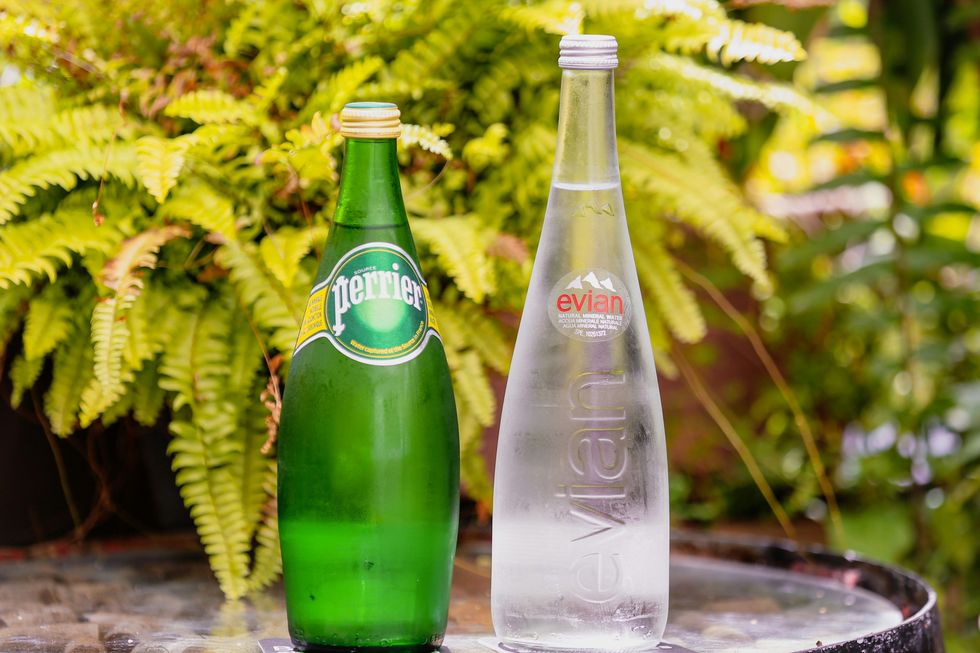
Unsplash
1. Invest in a Fun Water Bottle
There’s a far greater chance that you are going to drink water if you have a water bottle around you. So, cop yourself a cute one — one that will help you to stay motivated. A tumbler that I purchased some time back, just because I thought it was cute as hell, simply says, “Make Better Coochie Decisions” (amen?-LOL). Honestly, that doesn’t just have to apply to sex but how you treat your vagina overall — and that includes making sure that “she” has all of the fluids that she needs.
2. Try Some Sparkling Water or Mineral Water
At this point, I should take stock in Waterloo. It currently is my favorite kind of sparkling water and it has definitely made getting more water into my system easier to do. That’s because I will add some limes to it or a bit of fruit juice to it and that makes drinking water less “meh” for me. Another type of water that has bubbles in it is sparkling mineral water; it can also be beneficial since it contains magnesium, potassium and calcium.

Unsplash
3. Go Halfsies with Your Other Drinks of Choice
Speaking of making some all-natural soda (which is basically what happens when you add juice to sparkling water or sparkling mineral water), you can find yourself drinking more water while consuming less calories if you fill up your glass with half of your favorite fruit juice and half of some sparkling water. More times than not, the juice doesn’t even taste watered down. Try it before you doubt me.
4. Collect Some Infused Water Recipes
I’m forever gonna be a fan of infused water; that’s because it’s water that has fresh fruits and/or veggies in them — and it doesn’t get any healthier than that. Plus, infused water tends to take on the taste of whatever fruits or vegetables that you put into the water (if you let the stuff soak for a couple of hours), so that the water doesn’t taste so boring and bland. Wanna try a few recipes? You can check out some here and here.
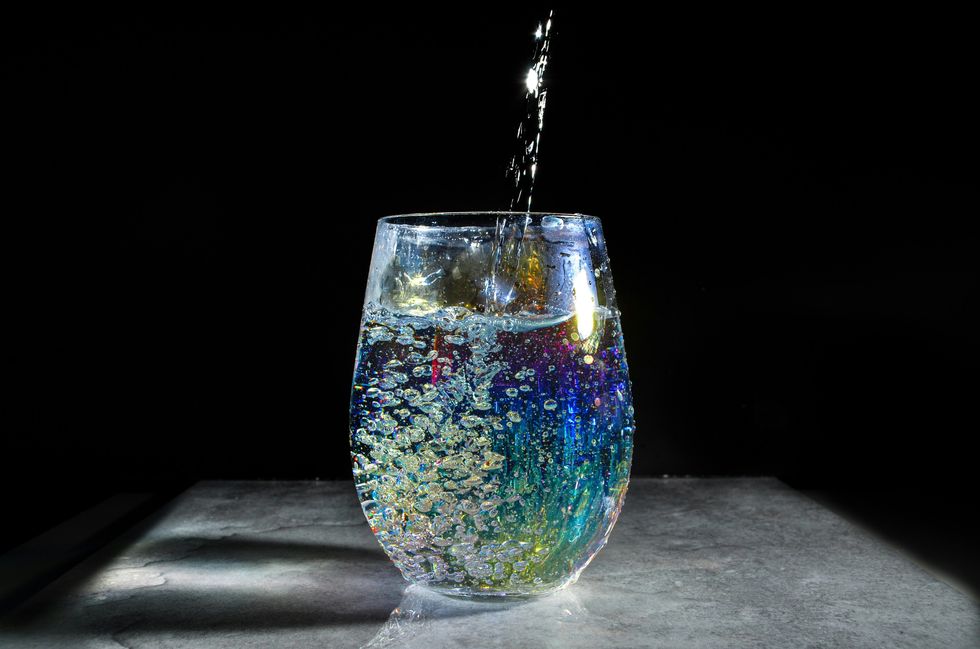
Unsplash
5. Make Slushies Instead of Smoothies
Are you someone who enjoys consuming smoothies? Well, if you want to get more water into your system, how about going with a slushie instead? Although it is true that some smoothies have water as a base, the most bomb ones use milk (or a milk alternative) or yogurt. Slushies, on the other hand, typically go with crushed ice (which is frozen water) instead. That said, some (pardon the pun) cool slushy recipes can be found here, here and here.
6. Use Water As Your “Drink Chaser”
Another great thing about water is it can help to keep you from overeating; it does that by causing you to feel full if you drink it while you are eating. And speaking of calorie-counting, if you don’t want to give up your favorite drink at mealtime, one way to keep from downing 2-3 glasses of it at a time is to use water as your “chaser.” What I mean by that is, after enjoying a glass of your favorite beverage, “chase it down” with a glass of water. That should satisfy your want for what you want without overdoing it.
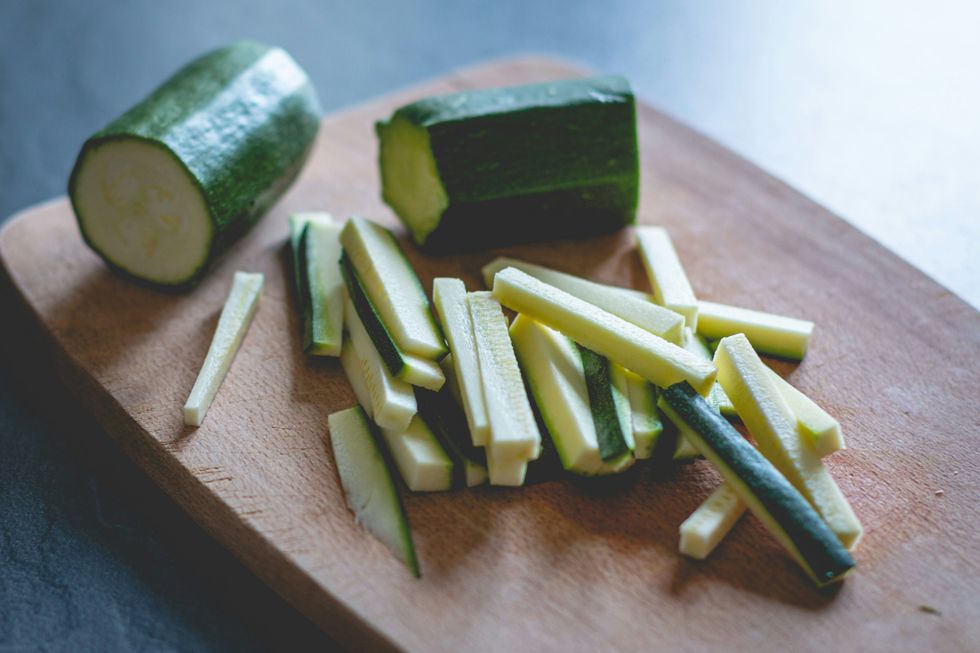
Unsplash
7. Eat Foods That Are High in Water Content
Another way to get more water into your body is to eat foods that have a ton of water in them. Some that top the list include lettuce (96 percent); cucumber (95 percent); zucchini (95 percent); celery (95 percent); strawberries (91 percent); cantaloupe (90 percent), and peaches (89 percent).
8. Have a Ball with Your Ice Cubes
Ice cubes are frozen water, right? That’s why most of us prefer to enjoy our drinks before the ice cubes melt because melted cubes water down whatever it is that we are consuming. And so, for this very reason, add more ice cubes to your drinks — and have fun making them. You can add juice, fruit and/or mint leaves while making your cubes. That way, they are aesthetically-pleasing; plus, they will also add more flavor to your water once the ice cubes actually melt.

Unsplash
9. Add Some Non-Alcohol Cordial to Your Water
If you’re fine with just having a tad of taste in your water, why not add a bit of cordial to it? Cordial is simply a type of tonic, syrup or sweetener (that can contain alcohol or not) that can help to make your water more…interesting. Some alcohol-based cordials can be found here. Some non-alcoholic recipes are located here.
10. Technically, Herbal Tea Counts
Tea is always gonna be my thing. That’s why I’ve penned articles on it for the site like “10 Different Ways Herbal Teas Can Fit Into Your Beauty Regimen”, “10 'Uncommon' Teas You Should Add To Your Stash (& Why)” and “I've Got 10 Teas That Will Help You To Age (Even More) Gracefully” And y’all, if you want to get a lot more water into your system yet a tall glass of water only isn’t your — pardon the pun — cup of tea, make some iced herbal tea instead.
It’s basically water with some herbs tossed in and, if you add some honey or raw organic coconut palm sugar to it, it will be a really sweet treat that will still be extremely hydrating (and very healthy) for you.
Water that is a bit more exciting for you…now. LOL.
Drink up!
Let’s make things inbox official! Sign up for the xoNecole newsletter for love, wellness, career, and exclusive content delivered straight to your inbox.
Featured image by Unsplash





